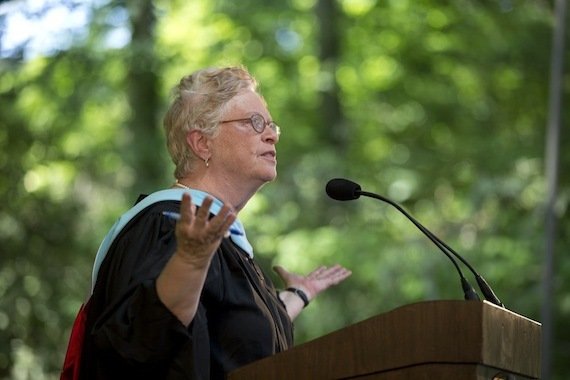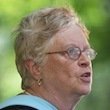Myrt Westphal - Baccalaureate

Audio Transcript
I want to thank President Chopp for her kind invitation to speak to the Class of 2013, their families and friends, to faculty, staff, students, and other visitors. Welcome to this beautiful place, a place for contemplation and reflection, something I have been doing a lot as I prepare to leave Swarthmore after 25 years. Now I have to say, this is not my usual place for doing business. I feel more comfortable speaking with you one-on-one and in a smaller place-preferably my rock and roll office! But here we are.
Many times I have been asked how I became a dean and how I learned what I needed to know to function as an advisor for all these years.
The simple answer is that some key Swarthmore people believed in me and my previous experiences, none of which were directly related to higher education. Rather they noted my roles as a community activist and a junior high school art teacher, my parenting philosophy, and that I, too, am a graduate of a liberal arts college. Meaning, I, too, can switch from political science and art to a career I didn't prepare for in college because I have broad-based skills and flexibility.
I learned how to be a dean by being guided by wonderful mentors, educating myself about issues in higher education, and by listening to stories. I long ago learned that if you know a person's story you can better understand that individual and why they do what they do - what makes them tick. Those stories came together to create a bank of experience and understanding that enabled me to gain insight into and support members of this community.
So now I'll share some of my personal stories to show how I learned my values, how to dean, and hopefully share ways in which you, too, might learn from life.
ABOUT PRIVILEGE: Growing up we didn't use this word, but through various experiences I realized I was a person who was having an easier life than others. I was born into an academic family, my father was a math professor and my mother had her master's degree, something highly unusual for a woman born in 1910. This was a time when faculty made pitiful salaries but I somehow absorbed that I was a member of a privileged class, because I had educational and cultural capital. It wasn't about money: I was rich with education and experience.
I lived for 10 years in a segregated South, in Atlanta, where I learned about another one of my privileges, my color. Experiencing separate waiting rooms, restrooms, drinking fountains clearly spelt out to me that there were things I could do that others could not do.
We moved to Bethesda, Md. and I learned about another type of privilege: citizenship. My mother was forced to relinquish her Canadian citizenship so my father could get security clearances for his work. My mom always thought of herself as Canadian and wondered why she couldn't be trusted.
My last example concerning privilege was when I didn't have it. I was female at a time when there were few opportunities for women in athletics. My male high school schoolmates got the teams, the coaches, and the opportunity to learn. In California, my college roommate had to join, pay for, and drive an hour to the L.A. Tennis Club for her training. I recall watching an early round, professional match played on a public park court. I watched her play the soon to become famous Billy Jean Moffett King. Thank you, Billy Jean, for what you have done for bringing this privilege to women!
ON BEING A FEMINIST: Perhaps you can understand why I am a dogged feminist based on those pre-Title IX experiences. Other life experiences taught me about the need to support women and their aspirations. I had college friends who had to go to Mexico to get an abortion or had to leave college if they got pregnant or married.
After graduation we got married, we moved to Cambridge, Mass. and we entered the world of the co-education of the Ivies. We were at Harvard and Princeton when they were becoming coed. At Princeton I wondered where the women would eat and congregate since the Eating Clubs were all male at the time. It was a time of change and struggle. While I know that the re-introduction of female fraternities here has created a lot of discourse and disagreement, I do believe that women should have control of some social spaces and social/personal life on campus.
Next, came our two daughters - they are strong feminists, both having worked to make the world a better and safer place for women. I am proud to say that my husband, Larry, a longtime professor here at Swarthmore, as well as a professor at Northwestern and Princeton, always strongly supported women in his economics classes. We keep in touch with many of these fantastic women and applaud their careers and life choices. One of them is just about to join the economics department as a new faculty member.
But my grandkids are boys-how do we educate them and support them to be good male citizens who understand their privilege while still allowing for their success and achievements? How do we make sure that they understand the needs of others and the importance of equity? I'll be joining in that effort soon when we move to Montana and I get to share in their lives as their grandmother and their dean.
Speaking of guiding these young boys, let's talk about misbehavior and one's moral compass.
Growing up I was expected to be a mannerly person and be well behaved - don't embarrass the family. I got a few spankings with the wooden spoon but I was aware that the guidelines and assumptions of our family were my real moral compass. I don't believe in physical punishment. I do expect people to do the right thing, accept responsibility if they do something wrong, and then try to educate themselves if they have made poor choices. I still recall our daughters saying, "Mom, would you just punish us!" But, in my mind that was the cheap way out - a way where you didn't have to look your misdeeds in the face and learn to make better decisions.
Through my study of history and political science, my experiences parenting, and my experience running the judicial process here, I know that laws and rules and punishments don't always work. They are a necessary underpinning but they don't always fix the problem. It is too easy to turn to the law, but I feel if you have to use the law, broadly speaking, you have lost. We need more humane and personal techniques to reduce the conflicts, and heal ourselves and respect others.
RESILIENCY: This is my current interest. Life is not always fair; bad things happen to good people; and things don't always turn out as we wish. But it is how we cope with these difficulties that define us.
On a personal level, I live with a husband who has been fallen with mental illness and is operating at about 10 percent of his usual gusto and high achievement. I begin to feel my age. I am about to leave a career I love and people who have meant so much to me for so many years.
At work, this has been the most difficult semester of my 50 semesters here. I find I am tired and dis-spirited. I am disappointed to experience a campus climate with factions and individuals in deep conflict about the nature of this place and how we treat one another. Many come from places of deep hurt, unfortunately others have been hurt here. Yet, I am still hopeful that Swarthmore will find its way back to its Quaker essence and positive community.
I have often told students and their parents that taking some time off, going on foreign study, or exploring the real world will help give perspective and develop some sense of direction and develop inner peace.
I intend to follow my own advice, to "get off the grid," slow down, and look at the world through the eyes of my grandkids as ways of rebuilding my resiliency. And I hope that as you engage the world in a different way and in a different space, you think about how you will maintain or restore your resiliency.
MY EDUCATION CONCERNING DIVERSITY: I've been fortunate to live in and travel to a diverse set of places: Lafayette, Ind.; Atlanta, Ga.; Bethesda, Md.; Evanston Ill.; Santa Monica. Calif.; Cambridge, Mass.; Princeton, N.J.; Seoul, South Korea; Alexandria, Va.; and Swarthmore. My husband was in demand as a strategist for developing economies and their industrial sector so we had opportunities to travel and live internationally. In the late 60s and early 70s we lived in South Korea three separate times-our older daughter was born there. During our 25 years in Swarthmore we had sabbaticals in Thailand and the Netherlands.
With broad exposure to East Asia - South Korea, Thailand, Cambodia, Hong Kong, Taiwan, Japan, China I found much to appreciate in the aesthetic, but found some attitudes towards women and the lack of democracy unsettling - curfews, armed police on corners, poverty. But, I learned about how different cultures work and what they value. I have witnessed the extraordinary economic development of these Asian nations and how they have bettered the lives of their citizens.
There are good and interesting people everywhere; long-term friendships develop. I found that getting involved facilitated getting acquainted. You perhaps can hear a continuation of things I have already talked about: the understanding of privilege and diversity, and a love of art and travel, family, people and their stories.
LEARNING AT SWARTHMORE: At Swarthmore I have played many roles and was mentored by the best. It was on-the-job training coupled with my values and principles, happily co-joined with the values and principles here. With our foundation values of academic rigor, caring about the individual and the community, knowing there is a light in each person, expecting the best from people, and the partnership of students, faculty and staff, Swarthmore College has been an overwhelmingly positive experience. I have found congruence in Quaker plainness, the Swarthmore quirkiness, our way of looking out for others and social justice. This has been a wonderful home, a place to continue learning from life and interact based on those lessons.
Learning from life never ends. I have a deep faith in education in the broadest sense, and I hope you share that belief. Each of you has a unique story, just as I do.
So I end by asking: What story does your life tell? What will people learn from you and you from them? I encourage you to keep open your eyes, ears, and hearts to the new experiences you will be encountering, be open to new opportunities, become involved, attend to your moral compass, and above all, listen to the stories of others - they will teach you much that will help you become a person who lives "the considered life."
Congratulations to you, the Class of 2013, your families and friends. And a hearty thank you to all the members of the Swarthmore community who have been a part of this chapter of your life story.



